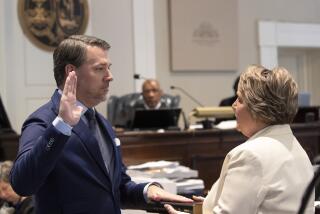McVeigh’s Lawyers Argue Their Case for a New Trial
- Share via
DENVER — Timothy J. McVeigh’s lawyers told a federal appeals court Tuesday that McVeigh deserves a new trial in the Oklahoma City bombing because of juror misconduct and media reports of a purported confession just before the case began.
The lawyers also argued in front of a three-judge panel of the U.S. 10th Circuit Court of Appeals that the judge at the trial, Richard P. Matsch, unfairly restricted questioning of prospective jurors about the death penalty.
Prosecutor Sean Connelly countered that the jury that convicted McVeigh and sentenced him to death for the April 1995 bombing of the federal building in Oklahoma City was impartial and diligent. The bombing claimed 168 lives.
An appeals court ruling is not expected before summer.
The claim of juror misconduct stemmed from a comment one juror allegedly made to another during a recess, before the prosecution’s case was completed and the defense had started. According to defense attorney Robert Nigh Jr., the juror said, “We know what the verdict should be.”
Nigh argued that the judge should have held a hearing to determine whether the jury had been tainted.
Connelly characterized the comment as “offhand,” pointing out that the juror never said what the verdict should be.
But Circuit Judge Mike Murphy said, “I don’t understand the possible harm there could have been by holding a hearing.”
Nigh was a member of McVeigh’s defense team at the trial and replaced Stephen Jones as lead attorney after Jones and McVeigh had a falling out last summer.
Nigh told the appeals court the defense was wrong to ignore a Dallas Morning News story about a purported confession by McVeigh.
Nigh said the defense had hoped that the issue would go away and didn’t want to draw attention to it. “We made a serious judgment mistake,” he said.
When the issue of the alleged confession was raised a second time by Playboy magazine, defense attorneys asked Matsch to move the trial or delay its start. He refused.
Nigh argued that publicity poisoned the prospective jurors’ minds. But Connelly disputed that.
Richard Burr, another McVeigh attorney, argued that Matsch improperly restricted defense questioning of prospective jurors.
More to Read
Sign up for Essential California
The most important California stories and recommendations in your inbox every morning.
You may occasionally receive promotional content from the Los Angeles Times.













